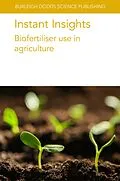- Considers the need to replace the application of synthetic fertilisers with more eco-friendly alternatives that have a reduced impact on the environment
- Reviews recent advances in the use of treated wastes to optimise crop health and nutrition
- Addresses key issues that can arise as a result of the use of bio-based fertilisers
Autorentext
Contributions by: Lidia Sas Paszt and Slawomir Gluszek, Research Institute of Horticulture, Poland; Sylvia Kratz, Kerstin Panten, Ewald Schnug and Elke Bloem, Julius Kühn-Institute, Germany; April Leytem, Robert Dungan, Mindy Spiehs and Dan Miller, United States Department of Agriculture, USA; M. J. Salomon, The Waite Research Institute and The School of Agriculture, Food and Wine, The University of Adelaide, Australia; S. F. Bender, Agroscope, Switzerland; T. R. Cavagnaro, The Waite Research Institute and The School of Agriculture, Food and Wine, The University of Adelaide, Australia; and M. G. A. van der Heijden, Agroscope and University of Zurich, Switzerland; Elisa Zampieri, Institute for Sustainable Plant Protection, Italy; Iakovos S. Pantelides, Cyprus University of Technology, Cyprus; and Raffaella Balestrini, Institute for Sustainable Plant Protection, Italy
